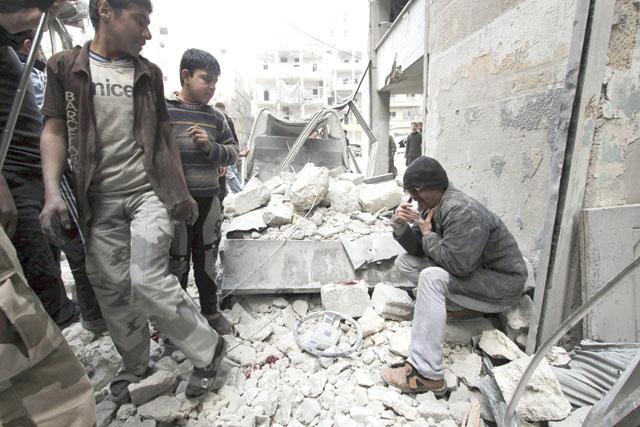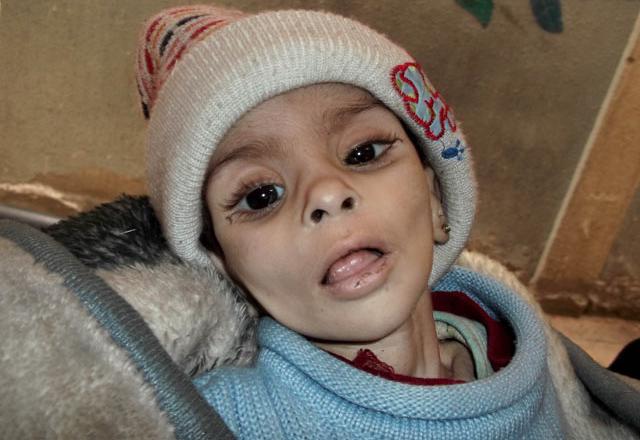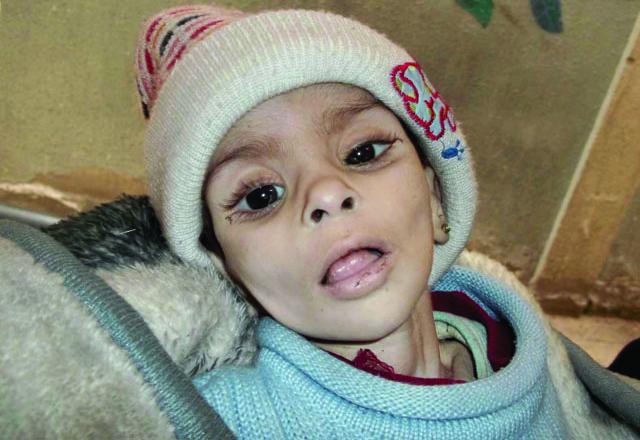You are here
Fighting adds to plight of destitute refugees in Syrian camp
By Reuters - Apr 15,2015 - Last updated at Apr 15,2015

BEIRUT — A bout of fighting between militants over control of the Yarmouk refugee camp on the edge of Damascus has only compounded the misery of residents already suffering from acute shortages of food, clean water and power.
The camp, set up in 1957 to house Palestinians, has become a symbol of the desperate plight of people in rebel-held territory since the Syrian government laid siege to it in 2013.
Fighters from Daesh terror group attacked the camp earlier this month, leading to a round of clashes with other militants.
Most Daesh fighters had withdrawn on Wednesday after largely defeating their rival, the Hamas-linked Aknaf Al Maqdis, leaving Al Qaeda-affiliated Al Nusra as the main group in the camp.
The respite may bring only a small measure of comfort to residents.
"We lack everything, even the lowest standards of living," a 40-year-old mother of two told Reuters by phone from inside Yarmouk.
Bread smuggled in to the camp is sometimes sold at 170 times its normal price, the woman said. Water tanks look like dirty swamps.
The power grid does not work, nor taps in houses. Residents have learnt to draw small amounts of electricity from phone lines to run small lights at night.
"Sometimes, I don't want to get up. Why get up only to regret it?" said the mother, who asked that her name not be used.
The camp was home to some 160,000 Palestinians before the Syrian conflict began in 2011, refugees from the 1948 war of Israel's creation and their descendents.
Most have now left. The Syrian government said on Tuesday only 6,000 remained.
UN Secretary General Ban Ki-moon said last week that residents "face a double-edged sword — armed elements inside the camp, and government forces outside".
In a school outside the camp, families from Yarmouk spoke to Reuters about how they escaped.
"We heard that [Daesh] were breaking walls and there were clashes. We did not know anything. When they came closer, people said they were killing women and children," said a Palestinian woman, who asked to remain anonymous.
Another woman, clutching a newborn child, said she thought she would die before she escaped.
“During the last hours we lived in a real misery we lost hope to stay alive. We waited for death with our children.”
Not all of Yarmouk’s residents have fled. Last Sunday, several dozen men and women, some waving Palestinian flags, held a protest inside the camp.
“It was a show of steadfastness by the people of Yarmouk, not to leave unless to go back to Palestine,” one protester said.
The 40-year-old mother also said she did want to leave, despite fighting hunger and a bout of jaundice. She feared she would be arrested by Syrian security agents. Many feel that way in Yarmouk, she said.
“There are many young men who are stuck — they defected [from the army] and now regret it.”
She never caught sight of the militants herself but heard the clashes.
“They didn’t knock on doors or storm anyone’s house,” she said.
More than 220,000 people have been killed in Syria’s civil war, which began when protests inspired by the Arab Spring uprisings erupted in March 2011 and were repressed by security forces.
An array of rebel groups, some of them hardline jihadists such as Islamic States, are now fighting the government, and sometimes each other.
About 4 million Syrians are now registered by the United Nations as refugees in other countries and about 6.5 million are internally displaced within the country.
Children in Yarmouk cannot recall life free of war.
“Our children don’t know what fruit looks like,” the 40-year-old mother said.
Related Articles
Palestinian fighters clashed with Daesh militants in a heavily contested Palestinian refugee camp in the Syrian capital on Monday as a United Nations official described the situation in the embattled camp as "beyond inhumane".
Children, the elderly and others displaced by Syria's civil war are starving to death in a besieged camp where women brave sniper fire to forage for food just minutes from the relative prosperity of Damascus.
Children, the elderly and others displaced by Syria’s civil war are starving to death in a besieged camp where women brave sniper fire to forage for food just minutes from the relative prosperity of Damascus.













